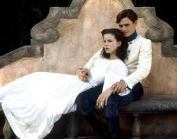A Poor Kind of Hero

A heart full of something all right
I’ve loved Les Miserables since it debuted on Broadway when I was 14-years-old. The music. The redemption story. The fact that here, in the same era of The Phantom of the Opera high soprano celebrated heyday, was a musical with not one, but two songs written in my contralto range. No surprise I identified most with Eponine, the poor, neglected girl in love with the heroic boy who falls in love with the hero’s daughter. I was fourteen after all. I have sung On My Own with suitable pathos for more than half my life so naturally I was ecstatic last year to hear a movie version of the musical was on its way led by none other than Hugh Jackman as Jean Valjean.
Perfection.
A year later, Les Mis the movie musical plays regularly on HBO. I’ve probably run through it about half a dozen times or more in the last few weeks. There are several disappointments, I won’t lie. But like any good piece of art, as old material found a new medium, I discovered a new revelation about this well-known story.
Marius is a real shit.

You’re dying, but at least you can still harmonize!
I’ve never been a huge fan of the Marius/Cosette romance (see affinity with Eponine above). Now it occurs to me that amongst all that swanning about a heart full of love, Marius is actually a total jackhole. He knows how Eponine feels about him; I mean, the guy isn’t blind. Yet he dismisses the street savvy (and likely non-virginal) Eponine for grander aspirations of liberty and equality, aspirations that mean little the minute the demure, innocent Cosette makes the scene. Yet when Eponine lies dying after taking the bullet meant for this tool, he lies and claims to love her! If Marius could close those wounds with words of love, Eponine would still be dead because he only vowed to love her when he knew there’d be no consequence! Not to mention that, once past his woeful Empty Chairs eulogy, Marius, the sole survivor of the barricade, returns to the wealthy and likely titled environs of his grandfather. Such a great guy there.

Looks more like a hard bench than a luxurious bed
That death scene of Eponine’s always makes me recall Claudio from Much Ado About Nothing (my favorite of Shakespeare’s comedies though Twelfth Night runs a very close second). Claudio is another romantic “hero” who derides his beloved—erm—Hero for her supposed infidelity. “She knows the heat of a luxurious bed.” Even Hero’s (supposed) death from shame doesn’t soften Claudio’s righteous indignation. It’s only when she’s proven falsely accused that he immediately change his tune, crying, “Oh, sweet Hero!” Oh, suck it, dude.
I had a similar reaction when I first read Wuthering Heights while a student at Oxford. For years I’d heard how great a romantic hero was Heathcliff, how this was a classic romance. Yet while brooding and bad boy-ish, Heathcliff is a horrible man, bitter and vengeful and totally lacking any concept of love. Mind you, Catharine is equally horrid, which further confuses the concept of this being any sort of romance, Gothic or otherwise.

Updated for the teenage set
Sure, all three of these “heroes” originate from source material written hundreds of years ago, but the Les Mis movie musical just came out last year, Much Ado has had its own resurgence with the fantastic Joss Whedon interpretation that came out this past summer, and Wuthering Heights got the upgraded high-school treatment for the MTV set in 2003. Such fools as these are still being held up as a kind of romantic ideal even today.
Yet none of them truly love at all because they don’t ultimately respect the object of their affections. Eponine, Cosette, Hero, even the deplorable Catharine are but constructs of these “heroes” ideals. (In the case of Eponine, the construct is formed in the nobility of her death) and when that construct cracks, so goweth (or belatedly cometh for Eponine) their love.
There’s nothing at all heroic about that.
Who are some of the worst “heroes” you’ve encountered in fiction?





